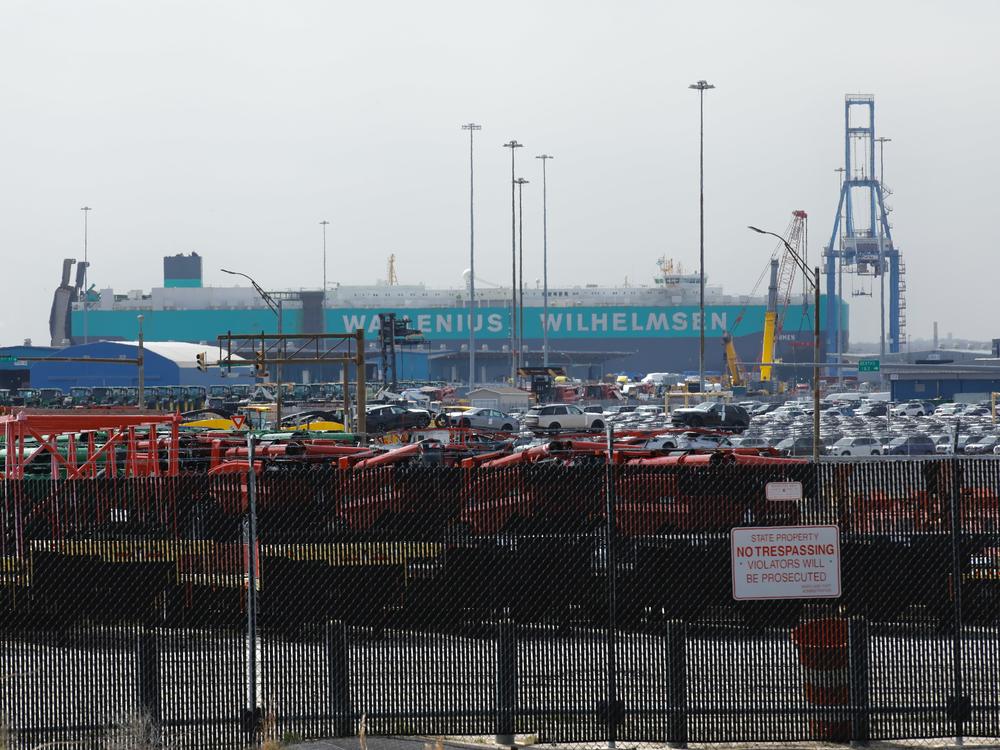Section Branding
Header Content
Mercedes, GM, Stellantis scramble; Port jobs are at risk after Baltimore disaster
Primary Content
The collapse of the Francis Scott Key bridge in Baltimore, a deadly disaster that's disrupted a major transit route along the east coast, has also shut down a large section of the Baltimore port.
The port is just a fraction of the size of large ones in the U.S. like Newark or Long Beach, Calif. But it plays an outsized role in auto imports and is economically significant to Maryland, in the densely populated Mid-Atlantic region.
Disruption at the port will have consequences, experts say, and that can often lead to ripple effects. But it isn't easy to project an economic toll yet, partly because we still don't know how long the port will be closed.
Tinglong Dai, the Bernard T. Ferrari Professor at the Johns Hopkins Carey Business School, knows the bridge well. He can see it from his office window in Baltimore.
"It's a very important bridge," he says. It's part of an busy highway, I-695, and has symbolic resonance too. But he predicts that the economic impacts of the disaster will be relatively short-term and geographically limited.
Baltimore handles a large number of auto exports and imports
The most adverse impact will be felt by the auto industry.
Baltimore handles more vehicle imports and exports than any other U.S. port. Last year, nearly 850,000 cars and light trucks passed through.
General Motors says it is working to reroute shipments to other ports. Mercedes says it's evaluating "several options" to adapt its supply routes. Stellantis, calling the Port of Baltimore "an important waterway for the automotive industry," similarly said it's working on contingency plans to ensure an "uninterrupted flow of vehicles."
Some automakers got lucky. Volkswagen and BMW both use a terminal by the entrance to Baltimore's harbor, in a part of the port that is not blocked off, and expect no impact beyond short-term traffic snarls for trucks today.
But for those that need it, rerouting can be a challenge. Not every port can accept every ship, because of size constraints. Cars are often transported on a special "roll-on, roll-off" or "ro-ro" vessels, which take skill to unload (the port of Baltimore prides itself on its regular "ro-ro rodeo" trainings to teach those skills).
And it's not just about getting a car off a ship. Facilities at ports do things like install accessories and inspect vehicles. And then you have to get them from the port to dealerships, which means you need trucks and drivers in place.
Dai, of Johns Hopkins, anticipates the shutdown will create delays for auto imports and exports as companies work to find alternatives to the widely used Baltimore port.
Shipping industry: disruption, but limited scope
Dai says the video of the bridge collapse is likely more dramatic than the impact of it on the overall economy.
Still, the timing isn't good. Attacks in the Red Sea and drought in the Panama Canal have already complicated global shipping. A disaster that shuts down an American port — so abruptly that six cargo ships are now trapped there — only adds to the disruptions.
Chris Rogers, the head of supply chain research at S&P Global Market Intelligence, notes that Baltimore's port handled around 3% of imports along the east and Gulf coast.
"Both bridge reconstruction and cargo delays are likely to be extensive," he wrote in a research note. "However, some freight across containerized and bulk modes could reroute to nearby ports in Wilmington, Delaware and Philadelphia, Pennsylvania."
Indeed, companies are already working to reroute that cargo, which can add delays and increase costs for affected shipments.
Some industries — like wood, construction machinery and steel or aluminum — will be more affected than others, Rogers notes.
It's a blow to the local economy as a key route disappears
It's not clear how long portions of the Baltimore port might be shut down. A prolonged closure would have short-term effects on industries, as they adapt to the loss of the port. But it could have much more serious consequences for Baltimore, and Maryland more broadly.
The loss of the bridge as a roadway disrupts a key commuting route, and the Chamber of Commerce warns it will likely disrupt commercial activities.
The port that's now partially blocked is a major employer, supporting more than 15,000 jobs directly and 140,000 jobs indirectly, according to the Maryland state government. Those jobs provide some $3.3 billion in personal income, $2.6 billion in business revenue and $400 million in tax revenue, the state says.
President Biden has acknowledged the importance of reopening the port quickly, for the sake of the people who work there.
"Fifteen thousand jobs depend on that port, and we're going to do everything we can to protect those jobs and help those workers," he said in remarks Tuesday.
The port has also received big investments to allow it to handle larger ships and more containers, as well as cut the carbon emissions from its equipment.
Dai says that the shipping industry has been pivoting more towards the east coast of the U.S., and that Baltimore's port is well-positioned to take on more business over time, despite this tragedy.
"I would expect in the coming decades, the importance of the Port of Baltimore will become greater, definitely not lesser," he says. "So this would be short-term disruption, a dent, but I think the growth is inevitable."

